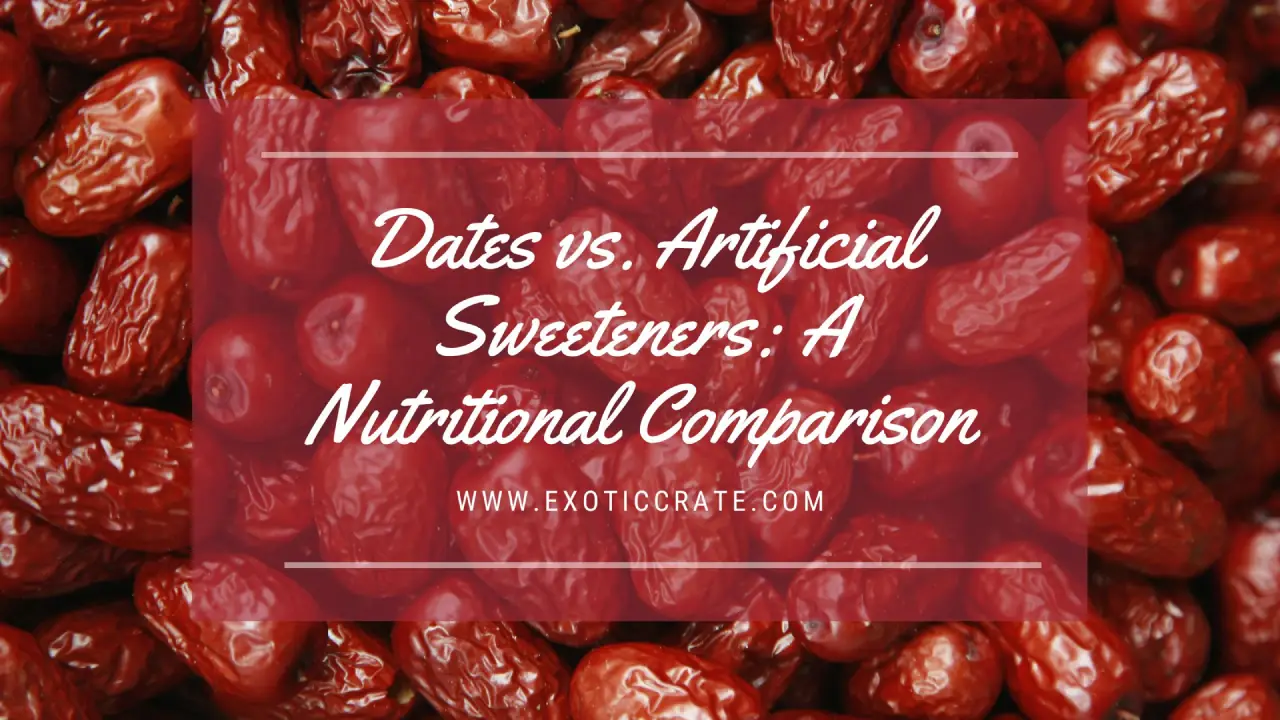Introduction: The Sweetness Dilemma
For centuries, humans have had a natural inclination toward sweet flavors. From honey gathered by ancient civilizations to jaggery and cane sugar that became trade commodities, sweetness has always held cultural, nutritional, and emotional significance. But in the modern era, sugar has become a double-edged sword. Its overconsumption has been linked to obesity, diabetes, cardiovascular diseases, and metabolic disorders. The result? A global movement to reduce refined sugar intake.
As health awareness has grown, two major alternatives have emerged: artificial sweeteners and natural sweeteners like dates. Artificial sweeteners have been promoted by food companies as “guilt-free” sugar substitutes—low in calories and safe for diabetics. At the same time, dates, one of nature’s oldest cultivated fruits, are experiencing a revival as a wholesome, nutrient-dense sweetener.
The debate is not simply about sweetness. It’s about nutrition, long-term health, taste, and trust. Artificial sweeteners may satisfy the taste buds without calories, but they come with controversies about gut health, metabolic effects, and overconsumption of ultra-processed foods. Dates, on the other hand, are whole foods that provide sweetness alongside fiber, vitamins, minerals, and antioxidants.
At Exotic Crate, as a leading Dates Supplier, we believe that the choice between dates and artificial sweeteners is about more than taste—it’s about choosing natural nourishment over chemical substitutes. In this blog, we present a deep nutritional comparison to help you understand why dates are increasingly preferred by health-conscious individuals worldwide.
Nutritional Breakdown of Dates vs. Artificial Sweeteners
When we talk about sweeteners, the first question most people ask is: “How many calories?” But nutrition goes far beyond calorie counts. Let’s look at what dates and artificial sweeteners bring to the table.
Dates: Nature’s Nutrient Powerhouse
- Carbohydrates: Rich in natural sugars like glucose, fructose, and sucrose, dates provide quick energy while also being moderated by fiber.
- Fiber: Around 7–8 grams per 100 grams, which slows digestion, stabilizes blood sugar, and supports gut health.
- Vitamins: Dates contain vitamin B6 (brain health), vitamin K (blood clotting), and small amounts of vitamin A.
- Minerals: Potassium (blood pressure regulation), magnesium (muscle function), calcium (bone strength), and iron (oxygen transport).
- Antioxidants: Flavonoids, carotenoids, and phenolic acids reduce oxidative stress and inflammation.
Artificial Sweeteners: Empty Sweetness
Common artificial sweeteners include:
- Aspartame (Equal, NutraSweet)
- Sucralose (Splenda)
- Saccharin (Sweet’N Low)
- Acesulfame-K (Sunett)
Nutritional profile:
- Calories: Virtually none.
- Nutrients: None.
- Other Compounds: Synthetic chemicals or lab-processed ingredients that only provide sweetness.
Key Comparison
- Dates nourish the body while sweetening food.
- Artificial sweeteners trick the taste buds without offering nutrition.
Impact on Blood Sugar and Diabetes
Blood sugar management is one of the most critical factors when choosing a sweetener.
- Dates: Despite their natural sugar content, dates have a low-to-medium glycemic index (GI) (42–55, depending on variety). Thanks to their fiber, they release sugar slowly into the bloodstream, preventing sharp spikes. For diabetics, when consumed in moderation and combined with protein or fat (like nuts), dates are a safe and nutritious option.
- Artificial Sweeteners: They don’t raise blood sugar directly because they are non-caloric. However, research suggests they may still impact insulin sensitivity and glucose tolerance by altering gut bacteria and confusing metabolic pathways. Some studies have linked regular consumption of artificial sweeteners to a higher risk of type 2 diabetes.
Verdict: Dates provide natural sweetness without destabilizing blood sugar, while artificial sweeteners raise concerns about long-term metabolic effects.
Satiety, Energy & Weight Management
One of the key reasons people turn to artificial sweeteners is weight management. But the picture is more complex.
- Dates: High in fiber, they keep you full longer and provide sustained energy. Athletes often use dates as a pre-workout or endurance snack. Their natural sugars are paired with minerals like potassium and magnesium, making them an energy-dense, nutrient-rich fuel.
- Artificial Sweeteners: They provide sweetness but no energy or satiety. In fact, they may confuse the brain, leading to increased cravings for high-calorie foods. This paradoxical effect has been observed in diet soda consumers who end up eating more overall.
Verdict: Dates win as a functional food that provides both sweetness and satiety.
Long-Term Health Effects
When comparing foods, short-term effects are important—but long-term health impact is even more critical.
Dates: Positive Effects
- Rich in antioxidants that fight free radicals, reducing risks of cancer and chronic disease.
- Support bone health with calcium, magnesium, and phosphorus.
- Aid digestion with fiber, preventing constipation.
- Promote brain health through vitamin B6 and antioxidants.
Artificial Sweeteners: Controversial Effects
- Gut Microbiota: Studies suggest sweeteners like saccharin and sucralose may disrupt healthy gut bacteria, which is linked to obesity and insulin resistance.
- Appetite Regulation: May interfere with satiety hormones, leading to overeating.
- Potential Risks: Some studies link long-term use with higher risk of metabolic syndrome, though evidence is still debated.
Verdict: Dates support long-term health, while artificial sweeteners raise red flags.
Culinary Versatility
Food is not just about health—it’s also about taste and experience.
- Dates: Naturally caramel-like in flavor, they are versatile. You can eat them whole, blend them into smoothies, bake with date paste, or drizzle date syrup over desserts. Middle Eastern and Mediterranean cuisines have used dates for centuries in both sweet and savory dishes.
- Artificial Sweeteners: Many have a bitter aftertaste. Some (like aspartame) break down at high temperatures, making them unsuitable for baking. Their role in cooking is limited compared to the richness of dates.
Verdict: Dates add depth, richness, and nutrition to recipes—artificial sweeteners only mimic sugar’s sweetness.
Consumer Perception and Global Trends
The global food market is moving toward clean-label, natural, and minimally processed products.
- Dates are increasingly marketed as a whole-food sweetener in health products like energy bars, smoothies, and “sugar-free” snacks that use dates instead of artificial additives.
- Artificial sweeteners, once seen as modern innovations, are now viewed skeptically due to studies linking them to health risks.
Global health-conscious consumers, especially millennials and Gen Z, prefer real foods over synthetic chemicals—making dates the future of natural sweetening.
Cost vs. Value
- Dates: While premium dates may cost more per serving, they deliver nutrients, energy, and antioxidants alongside sweetness. They represent value rather than just cost.
- Artificial Sweeteners: Cheaper, but offer nothing beyond sweetness. Long-term health risks may increase medical costs.
Verdict: Dates are an investment in health, artificial sweeteners are a shortcut with potential hidden costs.
Future of Natural Sweeteners
The natural sweetener market is growing rapidly, with dates leading the charge. Future trends include:
- Date Syrup & Paste: Replacing refined sugar in packaged goods.
- Organic Dates: Rising demand in premium markets.
- Functional Foods: Dates used in plant-based protein bars, shakes, and sports nutrition.
- Sustainability: Dates are eco-friendly compared to highly processed synthetic sweeteners.
As a Dates Supplier, Exotic Crate is committed to delivering high-quality, nutrient-rich dates to meet this demand.
Conclusion
The debate between dates vs. artificial sweeteners is not really a debate—it’s a choice between natural nutrition and synthetic substitutes.
- Dates provide sweetness with fiber, vitamins, minerals, and antioxidants.
- Artificial sweeteners offer only taste, with potential health risks.
For anyone seeking a healthier lifestyle, dates are the superior choice. At Exotic Crate, we take pride in being a trusted Dates Supplier, delivering premium-quality dates that not only satisfy your sweet tooth but also enrich your health.
Choose wisely. Choose natural. Choose dates.



